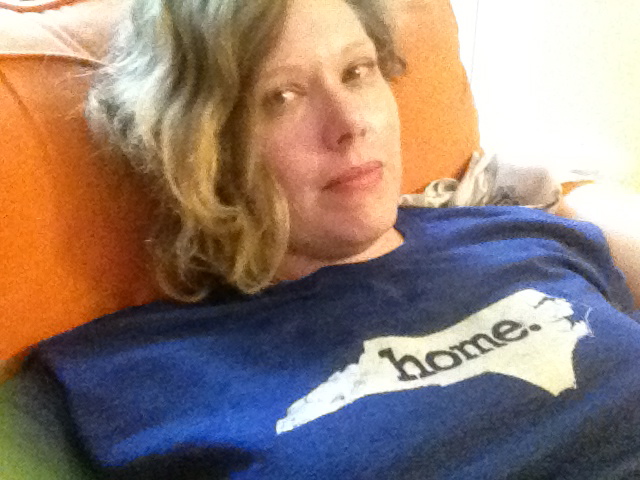Editor’s note: Writer and Love InshAllah anthology contributor Deonna Kelli Sayed is coming on board as a www.patheos.com/blogs/loveinshallah editor and our first monthly columnist!
Look for her column, “Thoughts of a Wasat Girl” every second Wednesday of the month!
I delivered a lecture about almost two decades ago at a regional conference sponsored by the Islamic Society of North America (ISNA) on Islam in America. That academic-type gathering occurred years before my marriage, in the middle of graduate school, and during my early stage as a writer and a Muslim.
In that long-ago lecture, I suggested the success for Islam in America was not merely about institution building or matters of isolation versus assimilation. What we needed, I pompously postulated, was to embrace the position of being in-between multiple cultures, because this transcultured space was globalism living out loud. It was where culture was happening, and we had to claim and name our power, that middle space – “wasat” culture. I predicted that Muslim women would be the ones to first secure this middle space through writing and cultural expression. I called such women Wasat Girls.
I remained a Muslim far and wide, but my writing stepped aside. Creative inertia set in, even during those cool, single Muslim woman years in Manhattan and Williamsburg, Brooklyn. I often smoked shisha in the East Village with beautiful daughters of well-known Arab intellectuals, merely steps from a mosque that had no space for women. Our conversations centered on marriage, politics, and the desire to be high-octane Wasat. Our worst fears were that we’d end up drab, voiceless spinsters.
I embraced writing again years later as a bored, overweight housewife. It was in a Tarrytown, New York writing workshop that my rusty prose leaped into motion. Such gatherings were often women-centric and we became familiar during our sessions. I revealed that I was soon to leave the U.S. to be a diplomat’s wife, and that I didn’t feel qualified to be someone with high social ranking.
One lady, a published writer on spirituality, looked right at me and said, “Well, I’m sure there are many women over there who aren’t educated and they do just fine!”
You know when you have a moment when time slows and sound becomes fuzzy and distorted? This woman named me as uneducated because of my Muslimness, because of my hijab. We had never shared our writing in this particular class. She had no idea of my voice.
I responded with drab, frumpy silence.
I moved to the Kingdom of Bahrain as a diplomat’s wife and I did better than fine. On this tiny island, I helped establish Elham, a mighty little creative arts group with Bahraini author Ali al Saeed and British-Kenyan artist, Phoebe Boswell. I started writing for local English-language lifestyle magazines and hosting creative writing workshops. Bahrainis and expats attended events, and I realized that being wasat-like wasn’t only for Islam in America, but also served as transformative spaces for Muslim societies. Bahraini women contributed as bloggers, artists, writers, and gallery owners. Even more intriguing, these exchanges changed non-Muslim expats, many of whom found unexpected creative power once they opened their cultural safety vows.
Magic does happen. Not too long ago, a long-lost acquaintance looked me up on Facebook. She wrote, “Is the divorce thing true? Twenty years ago, you told me it’s hard for us Wasat Girls. Things haven’t changed.” Imagine. Something I said in a forgotten lecture stuck with her. This Wasat-ness was a concept worth revisiting.
Yes, things are hard for us. But Wasat Girls are already happening, like the North African-Dutch singer, Rajae El Mouhandiz, who established her own record company and just released her first singer, “Gracefully.” Others like Dr. Amina Wadud, who long ago realized the power of wasat scholarship. Wasat words from the Saudi poetess, Nimah Nawwab, whom Elham brought to Bahrain for a reading. Or epic Wasat-ness, such as the editors of and contributors to Love, Inshallah, who realized the power in declaring that Muslim women can throw out powerful, transformative personal narratives.
One day, an expat friend living in Bahrain decided to look me up online, completely out of the blue. She told me how much my creative writing classes had meant to her. This was a woman who was learning to celebrate her own wasat-infused life. Her email came on a particularly painful, frustrating day during that my first year post-divorce, and almost five years after leaving Bahrain. I realized that wasat writing can script new personal and literary spaces, and that there are real ripples pulsating around the globe because of my small efforts. Writing creates this kind of power, I thought, and to think this happened in a part of the world where people assume women are silent.
Oh, I’m sure there are women over there with no education who do just fine. A decade later, I can finally embrace my Wasat Girl power as I speak back to that woman and say this: sit down and shut the fuck up.
—
Deonna Kelli Sayed is a Love, Inshallah contributor and author of Paranormal Obsession: America’s Fascination with Ghosts & Hauntings, Spooks & Spirits. She has also contributes to altmuslimah.com and Muslimah Media Watch. Deonna is currently working on a memoir. To learn more, visit her website, and join her on Facebook and Twitter.












